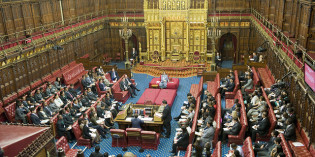Achieving accountable government

Local politicians take the party affiliation of directly elected mayors into account when forming coalitions
The UK now has a number of Directly Elected Local Authority Mayors, as well as the elected Mayor of London. But the extra layer of governance (and accountability) has implications for coalition formation at the local level. Drawing on research carried out in Germany, Martin Gross and Marc Debus argue that local politicians take the party […]

Recent trends in Italy showcase the ‘presidentialised’ future of democratic politics in Europe
Margaret Thatcher and Tony Blair were both accused of taking British politics into a ‘presidential’ direction, with highly visible and ‘strong’ leaders seen as the defining political force. But this trend is not unique to the UK, with Italy also moving in this direction under first Silvio Berlusconi, and secondly the incumbent Prime Minister Matteo […]

David Cameron is invoking a convention that does not exist in justifying his appointment of a tranche of new Lords
Yesterday Prime Minister David Cameron, seemingly undeterred by the already negative media coverage about the Lord Sewel affair, gave strong indications that he intends to make yet more appointments to the Lords. In doing so, he appeared to invoke a convention that does not exist: that of bringing Lords membership into line with Commons seats. […]

A progress check on the role and influence of the Government’s departmental non-executive directors
Government non-executive directors have a growing role, says Sir Ian Cheshire – and they will be important over the next 18 months as the Government tries to advance its agenda while introducing significant spending reductions. Daniel Thornton of the Institute for Government summarises a recent event held with Sir Ian in which he gave a […]

Domestic and European parliamentarians of the same party tend to pay attention to the same policy issues
Do members of the European Parliament (MEPs) act remote from their national party or do they coordinate their behaviour with their ‘home base’? Using data on written parliamentary questions from Danish MPs and Danish MEPs, Roman Senninger and Daniel Bischof show that issue attention across the national and European levels converges, especially within parties represented […]

All of Wales’ main parties have many supporters with views that the party leaderships would find uncomfortable
The rise of anti-immigration parties across Europe has led many to question whether their success has its roots in the prejudice of voters. In Wales, Roger Scully has carried out some research which shows which party supporters are prejudiced against which groups to what extent. Here, he shares his findings. The other day I was […]

The Government’s Freedom of Information commission tilts the political discussion towards damage and cost
On Friday of last week, the Government announced a new commission on Freedom of Information. Here, Ben Worthy offers his response to the announcement, arguing that the objections to the scope and usage of FOI that have been raised are nothing new, and furthermore aren’t unique to the UK. Further, he argues that the commission’s remit tilts […]

Research from Slovenia shows ‘administrative literacy’ is key in people getting the most from e-government services
Both e-government provision and digital and computer skills have come on leaps and bounds over recent years. But how important is digital literacy in getting the most out of e-government services? According to new research from Slovenia carried out by Bojan Cestnik and Alenka Kern, it is possibly less important than administrative literacy in this […]

The Canadian experience shows the benefits of embracing deliberative democracy
Canada shares a number of political and cultural characteristics with the UK, not least its Westminster system of government. Despite this, the North American country is streets ahead of the UK when it comes to the quality of its democracy, and as Peter MacLeod argues in this Policy Network repost, it has become something of […]

Time for the media shadow boxing to end, and for the democratic deficit in the expansion of the UK’s surveillance powers to be tackled
Since the Snowden revelations, the extent of the UK’s surveillance powers has come into sharp focus. This has been justified by the government and the security agencies themselves as being the necessary cost of freedom in an age of grave uncertainty and risk. Andrew Murray argues that the media ‘shadow boxing’ that has gone on […]


 Democratic Audit's core funding is provided by the Joseph Rowntree Charitable Trust. Additional funding is provided by the London School of Economics.
Democratic Audit's core funding is provided by the Joseph Rowntree Charitable Trust. Additional funding is provided by the London School of Economics.